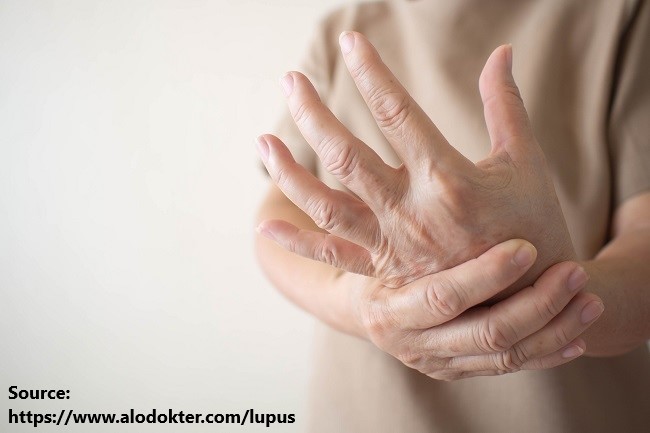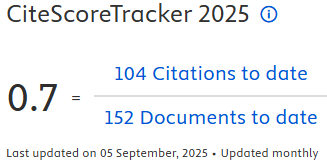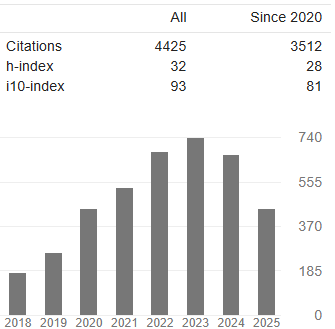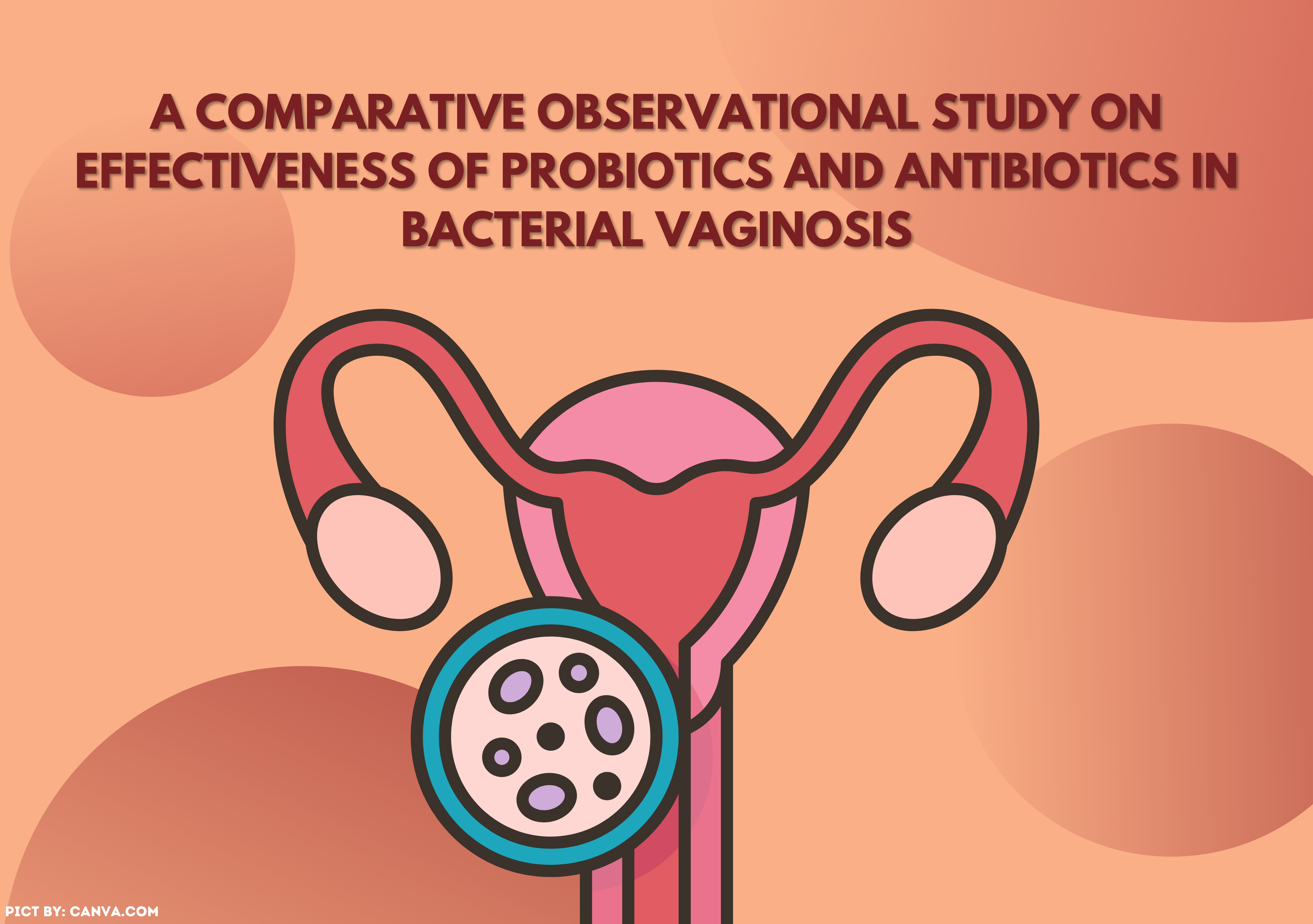AN OVERVIEW OF KNOWLEDGE LEVEL REGARDING THE SYSTEMIC LUPUS ERYTHEMATOSUS (SLE) IN PEOPLE WITH LUPUS (ODAPUS)

Introduction: Systemic Lupus Erythematosus (SLE) is lay disease in Indonesia. People with lupus must undergo lifelong treatment because the manifestations vary with high mortality rate. The aim of this study is to measure the level of knowledge of ODAPUS about SLE. Methods: This study was an observational descriptive with a cross-sectional approach. One hundred respondents were selected consecutively according to inclusion criteria from SLE patients who attended outpatients of Rheumatology Polyclinic in RSUD (Regional Public Hospital) Dr. Soetomo Surabaya from September 2019 to January 2020. The variable was knowledge level of ODAPUS about SLE and ODAPUS characteristics. Data analysis used descriptive statistical analysis. Data were obtained using LKQ-R questionnaires. Result: The result showed that majority of respondents are female (95%), aged 17-25 years (34%), had Senior High School (SHS) as their highest educational background (60%), do not work (53%), got the information about SLE only from health services (71%), and had lack knowledge about SLE (68%). There is no difference between knowledge about SLE in gender (p-value 0.123), a significant relationship between knowledge and educational background (p-value 0.005), and differences in the level of knowledge in group of information sources (p-value 0,000). Conclusion: In conclusion, most of the SLE patients have lack of knowledge about SLE, especially those who have SHS educational background and only depend on the health service as the source of information. Special interventions are needed as health promotion, especially in childbearing age women who likely suffer from the disease.
AA, J. V., McClellan, N. and Varacallo, M. (2018) ‘Lupus Erythematosus'.
Arikunto, S. (2012) Prosedur Penelitian : Suatu Pendekatan Praktik (Edisi Revisi), Rineka Cipta.
Azmi, A. (2017) ‘Perilaku Penemuan Informasi Kesehatan Dikalangan Penderita "Lupus”'. Universitas Airlangga.
Budiman, R. A. (2013) ‘Kapita selekta kuesioner: pengetahuan dan sikap dalam penelitian kesehatan', Jakarta: Salemba Medika, pp. P4-8.
Carter, E. E., Barr, S. G. and Clarke, A. E. (2016) ‘The global burden of SLE: Prevalence, health disparities and socioeconomic impact', Nature Reviews Rheumatology, pp. 605–620. doi: 10.1038/nrrheum.2016.137.
Fatmawati, A. (2018) ‘Regulasi Diri pada Penyakit Kronis-Systemic Lupus Erythematosus: Kajian Literatur', Jurnal Keperawatan Indonesia, 21(1), pp. 43–50.
Fava, A. and Petri, M. (2019) ‘Systemic lupus erythematosus: diagnosis and clinical management', Journal of autoimmunity. Elsevier, 96, pp. 1–13.
Feldman, C. H. et al. (2013) ‘Epidemiology and sociodemographics of systemic lupus erythematosus and lupus nephritis among US adults with Medicaid coverage, 2000–2004', Arthritis & Rheumatism. Wiley Online Library, 65(3), pp. 753–763.
Ferenkeh-Koroma, A. (2012) ‘Systemic lupus erythematosus: nurse and patient education.', Nursing standard (Royal College of Nursing (Great Britain) : 1987). England, 26(39), pp. 49–57; quiz 58. doi: 10.7748/ns2012.05.26.39.49.c9134.
Ghafirah, B. (2018) ‘Insiden Mortalitas Systemic Lupus Erythematosus (Sle) Aktif Di Rsud Dr. Soetomo Surabaya Periode Mei 2016–Mei 2017'. Universitas Airlangga.
Infodatin Kemenkes, R. I. (2017) ‘Pusat Data dan Informasi Kementrian Kesehatan Republik Indonesia: Situasi dan Analisis Lupus', Jakarta: Media Publis Kemenkes RI dikutip dari www. depkes. go. id.
Kaul, A. et al. (2016) ‘Systemic lupus erythematosus', Nature Reviews Disease Primers. doi: 10.1038/nrdp.2016.39.
Komalig, F. M. et al. (2008) ‘Faktor Lingkungan Yang Dapat Meningkatkan Risiko Penyakit Lupus Eritematosus Sistemik', Indonesian Journal of Health Ecology, 7(2). doi: 10.22435/jek.v7i2 Agt.1651.
Lynn, R., Wilberg-Neidhardt, S. and Margraf-Stiksrud, J. (2005) ‘Sex differences in general knowledge in German and Northern Irish university students', Sexualities, Evolution & Gender. Taylor & Francis, 7(3), pp. 277–285.
Notoatmodjo, S. (2010) ‘Konsep perilaku kesehatan', Dalam: Promosi Kesehatan Teori dan Aplikasi. Jakarta: Rineka Cipta.
Notoatmodjo, S. (2012) ‘Promosi kesehatan dan perilaku kesehatan', Jakarta: rineka cipta, pp. 45–62.
Peter, H. and Selvi, K. (2020) ‘Knowledge management: does gender matter? A systematic review of literature', Journal of Knowledge Management. Emerald Publishing Limited, 24(6), pp. 1315–1342. doi: 10.1108/JKM-08-2018-0472.
Pons-Estel, G. J., Ugarte-Gil, M. F. and Alarcón, G. S. (2017) ‘Epidemiology of systemic lupus erythematosus', Expert Review of Clinical Immunology. doi: 10.1080/1744666X.2017.1327352.
Rees, F. et al. (2017) ‘The worldwide incidence and prevalence of systemic lupus erythematosus: A systematic review of epidemiological studies', Rheumatology (United Kingdom), 56(11), pp. 1945–1961. doi: 10.1093/rheumatology/kex260.
Sari, N. P. W. P. (2016) ‘Faktor Pencetus Gejala dan Perilaku Pencegahan Systemic Lupus Erythematosus (Precipitating Factors and Preventive Behavior towards the Exposures of Systemic Lupus Erythematosus)', Jurnal Ners. Fakultas Keperawatan Universitas Airlangga, 11(2), pp. 213–219.
Sheba, S. H. et al. (2018) ‘Kepatuhan Minum Obat Pada Pasien Lupus Eritematosus Sistemik Di RSUP Dr. Hasan Sadikin Bandung', Majalah Kedokteran Bandung, 50(1), pp. 21–28. doi: 10.15395/mkb.v50n1.1229.
Shen, B. et al. (2013) ‘The correlations of disease activity, socioeconomic status, quality of life, and depression/anxiety in Chinese patients with systemic lupus erythematosus', Clinical and Developmental Immunology. Hindawi Publishing Corporation, 2013.
Tedeschi, S. K., Bermas, B. and Costenbader, K. H. (2013) ‘Sexual disparities in the incidence and course of SLE and RA', Clinical Immunology, 149(2), pp. 211–218. doi: https://doi.org/10.1016/j.clim.2013.03.003.
Waldron, N. et al. (2011) ‘"It's more scary not to know”: a qualitative study exploring the information needs of patients with systemic lupus erythematosus at the time of diagnosis', Musculoskeletal care. Wiley Online Library, 9(4), pp. 228–238.
Copyright (c) 2022 The Indonesian Journal of Public Health

This work is licensed under a Creative Commons Attribution-NonCommercial-ShareAlike 4.0 International License.
- The authors agree to transfer the transfer copyright of the article to The Indonesian Journal of Public Health effective if and when the paper is accepted for publication.
- Authors and other parties are bound to the Creative Commons Attribution-NonCommercial-ShareAlike 4.0 International License for the published articles, legal formal aspect of journal publication accessibility refers to Creative Commons Attribution-NonCommercial-ShareAlike 4.0 International License (CC BY-NC-SA), implies that:
- Attribution ” You must give appropriate credit, provide a link to the license, and indicate if changes were made. You may do so in any reasonable manner, but not in any way that suggests the licensor endorses you or your use.
- NonCommercial ” You may not use the material for commercial purposes.
- ShareAlike ” If you remix, transform, or build upon the material, you must distribute your contributions under the same license as the original.































